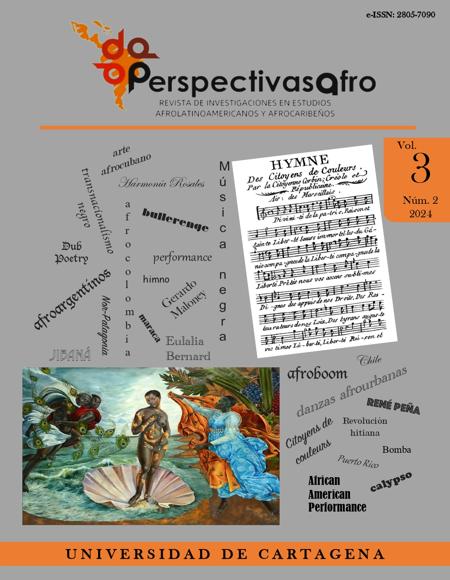Calypso, Carnaval y Covid 19: examinando la alegría musical negra en tiempos de una pandemia global a través de la lente de la música Calypso
Calypso, Carnival and Covid 19: Examining Black Musical Joy in Times of a Global Pandemic Through the Lens of Calypso Music
Contenido principal del artículo
Resumen
Este artículo se centrará en la música Calypso y Soca de Trinidad y Tobago y del Caribe holandés. En particular, se hará hincapié en dos estudios de caso de las islas holandesas de Aruba, Curaçao y San Martín y en el de la isla más meridional del Caribe, Trinidad, centrándose en el modo en que los productores y personalidades de la radio y la televisión evocaron la alegría y la nostalgia en su recreación de las festividades de Carnaval durante la pandemia.
Palabras clave:
Descargas
Detalles del artículo
Referencias (VER)
Assmann, Jan. “Collective Memory and Cultural Identity”. New German Critique 65 (1995): 125-133.
_____. “Memory, individual and collective”. The Oxford handbook of contextual political analysis. Robert Goodin and Charles Tilly Eds. Oxford, UK: Oxford University Press, 2006. 210-224.
_____. “Communicative and Cultural Memory”. A Companion to Cultural Memory Studies. A. Erll and A.Nuenning. eds. Berlin, Walter de Gruyter. 2008.
Austin, Roy. “Understanding Calypso Content: A Critique and an Alternative Explanation”. Caribbean Quarterly 22 (1976): 77-83.
Bennett, Andy. Popular Music and Youth Culture: Music, Identity and Place. Basingstoke: Macmillan, 2000.
_____. Cultures of Popular Music. Buckingham & Philadelphia: Open University Press, 2001.
_____. “Consolidating the music scenes perspective”. Poetics 32 (2004): 223-34.
Bennett, Andy, and Richard A. Peterson. Music Scenes: Local, Translocal and Virtual. Nashville, TN: Vanderbilt University Press, 2004.
Buchanan, Donna, A. Reviewed Work: Ethnicity, Identity and Music: The Musical Construction of Place Martin Stokes. Second Series, Vol. 52, No. 2 , pp. 427-430 (4 pages). Published by: Music Library Association. 1995.
Boyce-Davies Carole. “The Politics of African Identification in Trinidad Calypso”. Studies in Popular Culture 8/2 (1985): 77-94.
Cerulo, Karen A. “Social Disruption and Its Effects on Music: An Empirical Analysis”. Social Forces 62 (1984): 885–904.
Constance, Zeno. The Man Behind the Music: The People's Calypsonian, Brother Valentine. Port-of-Spain: Zeno Obi Constance, 2010.
Cowley, John. Carnival and Calypso: Traditions in the Making. Cambridge; New York: Cambridge University Press, 1996.
Dudley, Shannon. Carnival Music in Trinidad: Experiencing Music, Expressing Culture. New York: Oxford University Press, 2004.
Dunn, Geoffrey and Michael Horne. Calypso Dreams. Santa Cruz, CA: Geoffrey Dunn, 2006
Elder, Jacob Delworth. The Evolution of the traditional Calypso of Trinidad and Tobago; A Socio-Historical Analysis of Song-Change. Philadelphia: University of Pennsylvania Publishing, 1966.
Errl, Apaso. 2008. “A Companion to Cultural Memory Studies”. Cultural Memory Studies: An Introduction. Apaso Erll y Ansgar nunning, eds. Berlin: Walter de Gruyter (2008). 1-18.
Flavien, Isaac Janice. “The Translation of Carnival in Trinidad and Tobago: The Evolution of a Festival.” Tusaaji: A Translation Review 2/2 (2003): 42-55
Frith, Simon. 1996. Music and Identity. http://faculty.georgetown.edu/irvinem/theory/Frith-Music-and-Identity-1996.pdf.
Guilbault, Jocelyne. Governing Sound: The Cultural Politics of Trinidad’s Carnival Musics. Chicago: The University of Chicago Press, 2007.
Halbwachs, Maurice. On Collective Memory. Chicago: University of Chicago Press, 1992.
Hill, Donald. Calypso Callaloo: Early Carnival Music in Trinidad. Gainesville: University Press of Florida, 1993.
Liverpool, Hollis. Kaiso and Society. Diego Martin, Trinidad: Juba Publications, 1990.
_____. “Origins of Rituals and Customs in the Trinidad Carnival: African or European?” TDR/The Drama Review 42/3 (1998): 24-3.
_____. Rituals of Power and Rebellion: The Carnival Tradition in Trinidad and Tobago, 1763 – 1962. Chicago, Trinidad and Tobago: Research Associates School Times; Frontline Distribution, 2001.
[Lovey's String Band, 1890-1920: http://youtu.be/YGovSJkxzPw]
Olick, Jeffrey K, et al (Eds.). The Collective Memory Reader. New York: Oxford University Press, 2011.
Olsen, Dale. The Chrysanthemum and the Song: Music, Memory, and Identity in the South American Japanese Diaspora. Gainesville: University Press of Florida, 2004.
Regis, Louis. The Political Calypso: True Opposition in Trinidad and Tobago, 1962 – 1987. Cave Hill, Barbados: University Press of the West Indies, 1999.
Rohlehr, Gordon. Calypso & Society in Pre-Independence Trinidad. Port-of-Spain. Trinidad: G. Rohlehr, 1990.
_____. “Calypso and Caribbean Identity”. In Caribbean Cultural Identities. Glynne Griffith ed. Lewisburg, PA: Bucknell University Press, 2001. 55 – 72.
Smith, Keith. “Calypso Reinventing Itself.” Trinidad Express, 4 February. 2005. http://www.trinidadexpress.com/index.pl/article?id=58864809.
Sofo, Giuseppe. “Carnival, Memory and Identity”. Kultura 4/6 (2014): 17-24.
Stokes, Martin. “Introduction: Ethnicity, Identity and Music.” In Ethnicity, Identity and Music: The Musical Construction of Place. Martin Stokes, ed. Oxford, UK: Berg, 1994. 1-27.
Sylvester, Meagan. “Cultural Meaning, Social Hybridity and Musical Sonority: Unpacking Elements of the Trinidad and Tobago Identity in the Lyrics of its Carnival Music”. In ISA E-Symposium, Issue 3, December (2013). Online Article. http://sjdspace.sagepub.com/wp-content/uploads/2014/02/EBul-Sylvester-Dec2013.pdf
Sylvester, Meagan, et al. “An Era Re-Visited: Trinidad & Tobago's Indigenous Calypso Music – First Recordings, First Live Performances, First Music Publishing, and First Recordings on Film from 1900-1950”. ARSC Journal 44/2 (2013): 201-216.
Sylvester, Meagan and Lutalo Masimba. Personal Interview. Office of the Trinbago Unified Calypsonians Organisation, (TUCO) Jerningham Road, Belomont, Trinidad and Tobago. 2015.
Sylvester, Meagan A and Gregory Richardson. “Carnival, Culture Resilience and COVID19 in the Dutch Caribbean and in Trinidad and Tobago”. Masking as Quintessential Authenticity: Healing, Intersectionality and Interstices in the Languages, Literatures and Cultures of the Dutch Caribbean and Beyond. Faraclas, N. R. Severing, E. Echteld, S. Delgado and W. Rutgers, eds. Willemstad, Curaçao: University of Curaçao, 2021. 340.
Warner, Keith. The Trinidad Calypso: A Study of the Calypso as Oral Literature. London: Heineman, 1982.
Winer, Lise. “Socio-Cultural Change and the Language of Calypso”. New West Indian Guide 60/3 – 4 (1986): 113-148.



 PDF
PDF
 FLIP
FLIP
 HTML
HTML





